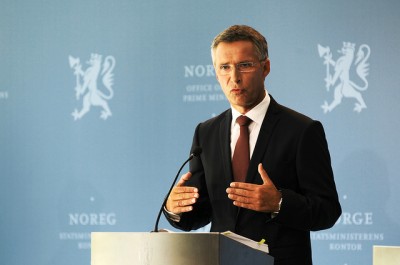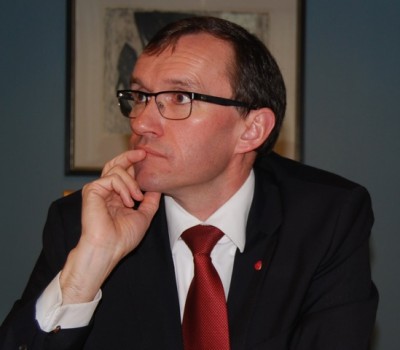Former Prime Minister Jens Stoltenberg came close last year to approving a secret document aimed at normalizing diplomatic relations between Norway and China, reported newspaper Dagens Næringsliv (DN) on Tuesday. He ended up dumping the apologetic document though, because it would have overstepped the bounds of government power and undermined Norwegian policy on human rights.

Diplomatic relations between Norway and China have been frozen since October 2010, when the Norwegian Nobel Committee awarded the Nobel Peace Prize to jailed Chinese dissident Liu Xiaobo. The Chinese were furious and offended, and immediately cut off top-level contact with the Norwegian government, even though the government has no control over the decisions of the Nobel Committee.
Both Stoltenberg’s Labour Party-led government and the new conservative government elected last year have made repeated but unsuccessful attempts to restore diplomatic relations with the Chinese. The attempt made in August 2013, just before last year’s national elections, may have appeased the Chinese but Stoltenberg apparently realized it would come at the cost of Norwegian principles and policies.
DN reported that the document also would have implied apologies and made promises to the Chinese that would have been impossible for either Stoltenberg’s government or future Norwegian governments to uphold. It was nonetheless the product of months of work by Norwegian diplomats under the guidance of Norway’s foreign minister at the time, Espen Barth Eide. He’d been so confident it would win approval that he told DN in August 2013 that he thought the diplomatic freeze between China and Norway would soon end.
That didn’t happen. Even though Eide told DN last year that Norway would not be making any apology for the Peace Prize, DN now reports that the secret document under discussion at a top level meeting in Stoltenberg’s office later that month contained “formulations” that China would interpret as a Norwegian admission that it was wrong to give the Peace Prize to Liu Xiaobo.

DN also reported that the draft document contained “an understanding” that Norway would work towards making sure that no other Chinese dissidents would receive the Peace Prize in the future. The document also contained “an understanding” that if Liu Xiaobo is released from prison, he would not be welcome in Oslo to accept his Peace Prize. The document also acknowledged China’s need to fight terrorism, understood as coming from uighur separatists in China.
The document itself was called a “non-paper” in diplomatic language, and would neither be signed nor written on government letterhead. It was meant to recognize how China viewed the controversial Nobel Peace Prize to Liu and define bilateral relations between Norway and China, but it was also meant to be kept secret by both the Norwegians and the Chinese.
Top-level confidential meeting
DN reported that when the document was discussed at a meeting in Stoltenberg’s most secure room at the Office of the Prime Minister, both it and other papers passed out to those present were then collected again, to prevent any from going astray. The document is now said to have been filed in the National Archives, sealed for 30 years.
Present at the meeting in August 2013 were Stoltenberg, Eide, Eide’s predecessor as foreign minister Jonas Gahr Støre, the top government bureaucrat Nina Frisak and Svein Sæther, Norway’s ambassador to China who’d been called home from Beijing.
It became clear at the meeting, though, that Stoltenberg could not defend the contents of the document. Eide is believed to have been disappointed, not least since he had spoken so optimistically just days before. Stoltenberg, however, could not go along with any apology or admission to the Chinese that the Peace Prize had been wrong. There’s also long been an informal agreement for his Labour Party and the rival Conservative Party to agree on foreign policy, and Stoltenberg also knew that the Conservatives would not approve of any apology for the Peace Prize. One of their own top politicians and current government ministers, Jan Tore Sanner, had nominated Liu for the Peace Prize in the first place.
Nor did Stoltenberg, who had no faith that the document could be kept secret, have any power to promise that future Peace Prizes not go to Chinese dissidents, or that Norway should prevent Liu from accepting his prize in Norway one day. “Then the government could just as well set the Nobel Peace Center on fire and stomp on a photo of Nelson Mandela,” wrote DN comentator Kjetil B Alstadheim, who also believes that the document never would have “tolerated the light of day.”
‘No comment’
Neither Chinese officials nor Eide or Stoltenberg would comment on the document. Eide, who later went on to work for the World Economic Forum and now is attempting to broker peace on Cyprus, said he couldn’t speak about “the internal process” regarding attempts to restore relations with China.
Stoltenberg, soon taking over as secretary general of NATO, confirmed that several internal meetings were held over the tensions with China. “It’s correct that the issue was discussed on several occasions between the prime minister and other affected ministers,” Stoltenberg told DN. “Beyond that, it’s not right for me to share details from internal processes in the government.”
Støre is the only one of the three still active in Norwegian politics, as new head of the Labour Party and Labour’s candidate for prime minister. He was deeply involved, as Labour’s longtime foreign minister, in trying to melt the diplomatic freeze until Stoltenberg transferred him to the health ministry to solve its crises. He wishes the new conservative good luck in trying to appease the Chinese without undermining Norwegian values and integrity.
“In our time in government, we never struck an agreement with the Chinese that was tied to normalizing relations,” Støre told DN. “We expect the current government is still working to achieve that. It has our support. We believe it’s important to have normal relations between China and Norway.”
Normalization was a top priority for the new foreign minister form the Conservative Party, Børge Brende, last fall, but his efforts have also failed so far. He’s also been distracted by the ongoing crisis in Ukraine and Russia’s military intervention, the violence between Israel and the Palestinians and the Islamic extremsts’ insurgency in Iraq and Syria, among other issues. Since the freeze with China hasn’t resulted in any major economic damage for Norway, the diplomatic freeze now entering its fifth year seems to have a lower priority in the face of more pressing matters.
newsinenglish.no/Nina Berglund

